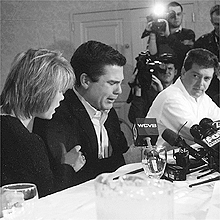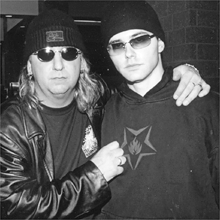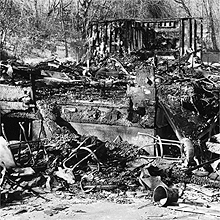Things like this are supposed to happen somewhere else.
Like Boston, where 492 people died 50 years ago as a result of fire at the
Cocoanut Grove nightclub.
Or New York City, where an arson fire claimed 87 lives in 1990 at the Happy
Land Social Club.
Or Chicago, where security guards using pepper spray to break up a fight
touched off a stampede that killed 21 people on February 17.
Something like this wasn't supposed to happen at a modest roadhouse off the
beaten path in West Warwick, where the Station's bookings -- heavy on '80s hard
rockers whose day had long since passed and tribute bands paying homage to
AC/DC and Van Halen -- meshed with an old factory town whose commercial
fortunes had crested decades earlier. The mingling of small-town patriotism
with rock verities was evident in a mural on the side of the club, where icons
like Janis Joplin and Ozzy Osbourne were set against the backdrop of an
American flag.
But the cataclysm came here, in the gritty heart of Rhode Island, with
stunning speed and staggering impact in a way that no one anticipated. Of the
300 or so people who were in the Station last Thursday, February 20, nearly a
third -- 97 -- lost their lives and most of the rest -- 187 -- were injured,
many of them critically, left to face a long and difficult road to recovery.
Station co-owner Jeff Derderian with his wife Linda
 |
It came after weeks in which government pronouncements and color-coded
warnings raised anxiety about a threat from abroad. And although the cause was
wholly different and the toll far smaller, the terrorist attacks of 9/11
provided a familiar frame of reference -- from the hellish quality of the
disaster scene and the nightmare of lost and grievously injured loved ones, to
the heroism displayed by rescuers and the heartening sense of a community
coming together.
There was the only-in-Rhode Island quality of how the Station was co-owned by
Jeff Derderian, a reporter for WPRI-TV (Channel 12), whose cameraman,
apparently gathering stock footage for a story about nightclub safety in the
aftermath of the fatal Chicago stampede, taped an unexpectedly chilling tableau
that was broadcast over and over on national television. As those at the front
of the audience happily raised beers or pointed their hands in the air, singer
Jack Russell kicked Great White into its first song, "Desert Moon," jauntily
shaking his mike stand from side to side, unaware that sparks from the
pyrotechnics display behind him were already sending flames toward the club's
ceiling.
Within just three minutes, fire and acrid dark smoke engulfed the Station,
destroying it, in the fourth worst nightclub disaster in US history. Stunned
Rhode Islanders were left with the task of trying to make sense of how a
carefree night suddenly turned into the worst disaster in the state since the
Hurricane of 1938, when 262 people were killed. Although the club had four
exits, most patrons were familiar with only the main entrance, leading to a
panic in which many people were unable to escape a horrific pileup near the
front door.
Great White's Jack Russell and Dave Filice
 |
The loss of so much life would represent a tragedy anywhere, but it struck
especially hard in Rhode Island, the nation's smallest state, where no place is
more than an hour away by car and the fire claimed one tenth of one percent of
the state's population. The state's typical intrigues -- the recent discovery
of a secret taping system at the Providence police station, a battle between
the House speaker and Senate president -- quickly seemed irrelevant.
After the fact, a few things seemed obvious: Great White's pyrotechnic
arrangement -- a fan of so-called gerbs, which shot tall cascades of sparks in
three different directions behind the band -- was utterly ill-suited for a
low-ceilinged club like the Station, where foam soundproofing behind the stage
seems to have spread the fire. And regardless of whether permission was granted
for use of the gerbs -- a question disputed by Great White and the Station's
owners -- the professional and legal standards for using fireworks in such a
situation, such as surveying the stage area for potential hazards and having a
permit, appear to have been given short shrift.
Governor Donald L. Carcieri, facing his first test since taking office in
January, spoke for the state's residents while mustering a steady calm and
quiet confidence in daily briefings. The conflagration "shouldn't have
happened, didn't need to happen," said Carcieri, who ordered a safety review of
smaller venues like the Station and a moratorium on the use of pyrotechnics in
such clubs. "Someone made a very, very bad decision."
Part of the speculation centered on whether Great White was trying to
recapture its glory days by incorporating elements better suited to an arena
than a small club. Russell disbanded the group after a New Year's eve gig in
2001, moving away from the kind of hard rock that had given Great White a hit
with a cover of Ian Hunter's "Once Bitten Twice Shy." But by early 2003,
Russell had reconstituted Great White with fellow original member Mark Kendall
and several newcomers, including guitarist Ty Longley, who perished in the
fire. As part of a promotion for the band's "Play On" tour, which began January
23 in Glendale Heights, Illinois, GW's Web site crowed, "1500 fans in the
Chicago House of Blues can't be wrong! This band is the most potent line-up
Great White has ever had."
The charred remains of the Station
 |
It's understandable that the West Warwick fire, coming just four days after
21 were killed in Chicago, has prompted a nationwide focus on nightclub safety.
Just as 9/11 caused us to look skyward at every approaching plane in the
ensuing weeks, the Station disaster has caused people to carefully take note of
the entry and exit points of clubs, restaurants, and other public venues.
But Rich Lupo, the owner of Lupo's Heartbreak Hotel, one of Rhode Island's
most popular venues for live music, disputes suggestions that rock clubs aren't
stringent about safety. "People don't appreciate in general how incredibly
strict the fire marshal's office is, and how incredibly strict codes are for
us, because we are places of public assembly," Lupo says. "There are all kinds
of building codes and fire preventative codes that we have to obey. We are
inspected. We are surprise inspected. And I don't mean to point the finger, but
I don't believe what happened in West Warwick could happen at Lupo's. We have a
sprinkler and a fire preventative system linked to the fire system." (The
Station didn't have a sprinkler system because the building had been
grandfathered in after the adoption of a sprinkler requirement for such
structures.)
Lupo, who has operated clubs in Providence since the mid-'70s, says he can't
recall an instance in which a band wanted to use pyrotechnics at one of his
venues. And it did seem unusual, he said, that such devices would be used at a
place like the Station.
There were reports that Great White had recently introduced the use of
pyrotechnics without permission at several clubs, including the Stone Pony in
Asbury Park, New Jersey. Other accounts indicated that Great White didn't use
the pyro at some other venues after being denied permission. There were
reports, too, that other bands, including a Kiss tribute that played the
Station last summer, had used pyrotechnic elements without incident.
All that was in the past. In the aftermath of a fire that brought so much
death and devastation, everything was different.
Mementos from loved ones / Photos by Richard McCaffrey
 |
BY THE NEXT MORNING, scores of reporters, photographers, satellite trucks, and
anxious relatives and acquaintances were camped across Cowesett Avenue from the
charred remains of the Station. The 300-person capacity club, which dated in
various incarnations as a nightspot and restaurant to the '40s, was reduced to
rubble -- a grim indication of the dawning heartbreak. The continuing
investigation, which includes a grand jury proceeding, had already started.
Karen Lee Ziner, a veteran Providence Journal reporter, was approaching
the end of her four-to-midnight shift the previous night when she heard
something on the police scanner about a raging fire and a request to send every
available rescue unit. Racing to West Warwick a short time later, she
encountered the resulting chaos as rescue workers triaged the injured and dazed
people stared at the inferno engulfing the Station. "I said to someone, `This
is like hell,' " Ziner recalls. A sound tech for the club and Jack Russell were
already debating whether the band had permission to use the pyrotechnics blamed
for the fire.
As a reporter covering the scene, Ziner felt mixed emotions. She felt
terrible, she says, "because I was watching a lot of people and thinking they
look like they're not going to make it, and it felt really invasive. I just
felt like I was in the way, but that goes with the territory. You know, the
press is in the way [as a witness at terrible events], but we're not in
the way -- that's our job. It was a very traumatic night."
Although reporters, like cops and firefighters, often adopt a necessary degree
of detachment in responding to situations involving the loss of life, the
magnitude of the West Warwick calamity made it impossible to maintain a typical
degree of distance. "Just from a human level, it's depressing," says Jim
Taricani, an investigative reporter for WJAR-TV (Channel 10), and occasional
contributor to the Phoenix. "I don't see how it could not be depressing.
In some ways, we've developed a hard edge, but when you come across a situation
like this, with a massive loss of life and how it happened -- people going out
to have a good time and they end up dying in such large numbers," you can't
help being impacted. Such an effect, Taricani hastened to add, is nothing
compared to the suffering of those in the fire and their family members.
Peer counseling was made available to many of the police officers and
firefighters who responded to the scene. "As much as they're doing their jobs,
they're human also and they feel for everyone else -- the victims and the
families," says Major John J. Leyden Jr. of the Rhode Island State Police.
Although troopers must be prepared for dealing with anything, "I don't think
anyone ever envisioned being involved in this type of incident."
The timing of the fire at about 11 p.m. Thursday coincided with a shift change
at Rhode Island Hospital, the state's only trauma center, a fortunate
coincidence that provided a greater number of nurses and other staffers to deal
with the initial response. Now, in the aftermath, many fire survivors face a
painstaking path to recovery because of the seriousness of their burn injuries.
"This is really hard not to get emotional about," says a doctor, who requested
anonymity. "You walk in and you want to overdo things [to help the
patients]."
"It has been extremely difficult," the doctor adds. "The rest of the hospital
is very strangely quiet, somber. Everybody knows somebody [who was impacted by
the fire]. It's on everybody's mind." In a world where people typically
complain about petty concerns, "I think it makes you put things in
perspective."
THE WEST WARWICK fire happened as we face the prospect of war. For some, the
terrible and unexpected disaster only heightened a sense of things coming
undone in an increasingly scary world.
At the same time, the outpouring of sympathy and assistance for the victims
and their families speaks to our best instincts, an ability to be compassionate
and generous in responding to grief and sorrow. Relief funds have been
established and various groups -- ranging from local musicians to the Rhode
Island Supreme Court -- have offered their assistance. "I think in some ways
the West Warwick event is really unifying the state, the same [effect] that
September 11 had on the nation," says WHJJ-AM talk-show host Arlene Violet.
"It's these kind of events that wake us up, I think, to the importance of
everyday living and how a single night of fun can turn into a disaster because
of bad decisions being made."
Amos Sanfilippo of Plymouth, Massachusetts, who plays guitar in Diver Down, a
Van Halen tribute band, played the Station numerous times in the last six
years, most recently at the end of January. The band's drummer, Jay Gates, was
among those who escaped from the fire without serious injuries. Sanfilippo says
he is working with other tribute bands to plan a warm-weather outdoor benefit
for the fire victims. "Everybody wants to do something to jump in and help
out," he says. "We've been playing that club since 1996, so I kind of feel like
we're part of the family."
A lot of those who were at the Station for the ill-fated Great White show were
in their 30s and 40s, many of them with families of their own, suggesting the
central place that popular music occupies in our culture. Considering this, it
was no surprise that some of those mourning the deaths of the fire victims
would turn to music as a source of solace, even as the offhand names of some of
the bands playing Providence shows this weekend -- Life This Week, Crash and
Burn -- took on unexpected connotations. Musicians were encouraged to bring
their instruments during one memorial service last weekend at St. Francis
Chapel in downtown Providence.
Some musicians were also surprised by the reception they received in playing
out in the night after the fire. Phil Maigret, who plays guitar in Jeri and the
Jeepsters, says he and his wife, Jeri Verdi, debated whether to play a
scheduled gig last Friday at Cady's in West Glocester. They had seen the
television coverage the previous night and weren't able to sleep until 4 a.m.
But they resolved to play the gig, Maigret says, and found a solid audience of
about 100 that seemed to welcome the music at the small club. "Everybody was
talking about it, what had happened," he says. "At the same time, everybody
wanted to forget about it."
The full fallout of the terrible fire at the Station will take weeks, months,
and even years to come out. As that process continues, Rhode Islanders will
likely live with a similar duality -- being gripped by the tragedy while also
trying to move beyond it.
Ian Donnis can be reached at idonnis[a]phx.com.
Issue Date: February 28 - March 6, 2003










